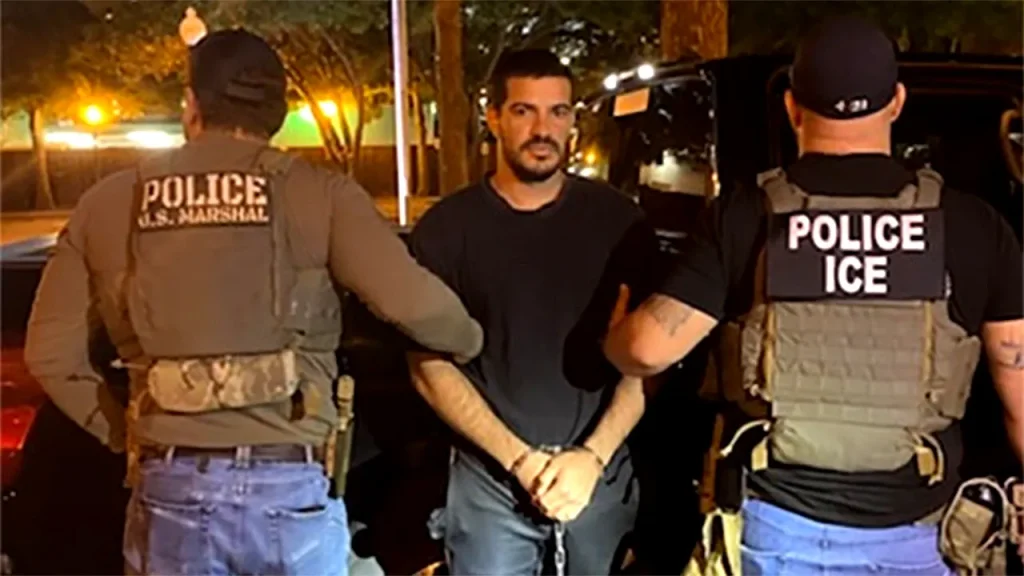Venezuelan Fugitive Wanted for Russian Roulette Attack Arrested in Texas
In a disturbing case highlighting the challenges of international law enforcement and immigration control, U.S. authorities have apprehended a Venezuelan national wanted for a horrific crime against a woman in his home country. Raul Enrique Pargas Rodriguez, 31, was arrested in Plano, Texas, after being identified as a fugitive wanted in Venezuela for attempted femicide. According to ICE Enforcement and Removal Operations (ERO) Dallas, Pargas Rodriguez allegedly subjected a young woman to torture in what officials described as a “twisted version of Russian roulette.” The case represents not only a serious violent crime but also raises questions about how potentially dangerous individuals can move across borders and remain at large in new communities.
The alleged crime, which occurred on February 24, 2021, involved Pargas Rodriguez luring a woman to his workshop in Venezuela where the situation quickly deteriorated into violence. According to the warrant, he launched into a violent tirade, verbally abusing and physically attacking the woman. In perhaps the most chilling moment of the assault, he allegedly pulled out a pistol, pressed it against the victim’s head, removed the bullets, reloaded it, and pointed it at her again in a terrifying game of Russian roulette. The woman managed to escape this life-threatening situation, after which Pargas Rodriguez apparently fled Venezuela, understanding the serious consequences he would face if apprehended there. His flight led him to the southern border of the United States, where he entered illegally near Eagle Pass, Texas, in August 2022, setting in motion a complex saga of border enforcement and criminal justice.
The path of Pargas Rodriguez through the U.S. immigration system reveals some of the complications and challenges in handling cases involving potentially dangerous migrants. When initially apprehended after crossing the border in 2022, U.S. Border Patrol released him on his own recognizance pending immigration proceedings, a decision that allowed him to remain in the country despite his illegal entry. More troublingly, ICE had another encounter with Pargas Rodriguez at the Dallas County Jail in November 2023 after he was arrested for assault—suggesting potential continued violent behavior—but he was not taken into custody at that time. ICE cited “prosecutorial discretion as a result of immigration enforcement priorities” for this decision, highlighting how resource limitations and policy decisions can sometimes lead to individuals with concerning backgrounds remaining free in communities. This aspect of the case may fuel ongoing debates about immigration enforcement priorities and public safety.
The breakthrough in the case came this month when ICE received an investigative referral from Border Patrol indicating that Pargas Rodriguez was not only living illegally in North Texas but was also wanted in Venezuela for attempted aggravated femicide. This information sharing between agencies proved crucial, demonstrating the importance of inter-agency cooperation in identifying and apprehending potentially dangerous individuals. Acting on this intelligence, a joint operation involving ICE, the Texas Department of Public Safety, and U.S. Marshals located Pargas Rodriguez in Plano on August 14 and successfully took him into custody without incident. “Thanks to a tip from the U.S. Border Patrol, we were able to track him down and safely take him into custody so that he can be repatriated to Venezuela to face justice for his alleged crimes,” said ICE ERO Dallas acting Field Office Director Joshua Johnson, underscoring the value of collaborative law enforcement efforts in resolving complex cases with international dimensions.
This case touches on several sensitive and contentious issues in the current political landscape, including border security, immigration enforcement priorities, and the handling of individuals with violent histories who cross borders. Critics of current immigration policies might point to this case as evidence of systemic failures that allowed a fugitive wanted for a violent crime to enter the country, be released, and even have subsequent contact with law enforcement without being detained. The case might raise questions about screening procedures at the border and information sharing between countries regarding wanted criminals. Additionally, the fact that Pargas Rodriguez was arrested for assault in 2023 but not detained by immigration authorities at that time despite his illegal status raises concerns about enforcement priorities and public safety considerations in immigration policy. These aspects of the case may become talking points in ongoing debates about border security and immigration enforcement.
Pargas Rodriguez now remains in custody pending immigration proceedings, which will determine whether he will be deported to Venezuela to face charges for the alleged attempted femicide. The case serves as a reminder of the complex interplay between criminal justice, immigration enforcement, and international cooperation in addressing violent crime. It also highlights the importance of information sharing between law enforcement agencies both domestically and internationally. While the successful apprehension of Pargas Rodriguez represents a positive outcome for law enforcement, the case’s trajectory—from the violent crime in Venezuela to the eventual arrest in Texas—reveals potential gaps in systems designed to prevent individuals wanted for serious crimes from finding safe haven in other countries. As the legal process unfolds, this case may provide valuable lessons for improving coordination between immigration enforcement and criminal justice systems across international boundaries, with the ultimate goal of ensuring public safety while maintaining the integrity of immigration processes.


